#oral tradition
Text
Hello, all! I’ve recently been really intrigued by American folklore that’s related to fields and crops. Since I have never lived in very rural areas, and since I’m not American myself, I’d never heard such legends. Some time back in the springtime, one of my online American friends told me about how her mother forbade going into the fields, or looking at them at night, due to “the people who lived in them”. Other such friends posted about how their family would place mason jars filled with glass shards in the backyard, as some kind of protection from whatever hid in the fields. But I looked up these legends online and I unfortunately haven’t found much.
If you’re someone who knows about these types of folkloric beliefs, please share them with me! I’m not even sure they’re exclusive to America, so if this applies to you are you’re not from the US, please share as well! I really want to find out more about them, but my research has been unsuccessful so far.
#folklore#witchcraft#paganism#wards#legends#oral tradition#spirituality#polytheism#spirit work#spirits#heathenry#pagan
84 notes
·
View notes
Text
old-timey folk remedies (& folk magic?)
I've been neglecting this tumblr for awhile (TBH I forgot)
But I'm back to my slow journey of reconnecting with my Chinese side of my ancestry and I got a treat for you all! Here are some old timey Chinese folk remedies.
TW: gore
The best part of chatting with your elderly members of your family is when they start spilling stuff from the past. I love it when my grandma and grandpa starts recounting folkloric shenanigans they did and the small folk remedies their parents and grandparents gave them. These remedies are all oral traditions, as it's the norm for most Chinese folk religion-related things. From a time when your average person didn't have access to a physician, doctor, or hospital. Or when the did, they couldn't afford to visit for non-urgent reasons.
A SMALL COLLECTION OF FOLK REMEDIES:
-TO REMEDY DIARRHEA: when you buy pomegranates, save the peelings and dry them under the sun. They can be simmered in water into a tea and given three times a day to those with an overactive bowel.
-TO GET RID OF WARTS: roll a blunt out of well dried mugwart leaves that was collected and hung on the front door during Duanwu Festival (dragon boat festival). Light the blunt and place it just close enough above the wart that you can feel the heat but not so close that it burns you. Make circular motion around the wart with the lit blunt while gently blowing on it. Do this when you wake up and before you go to bed. Repeat daily until your wart disappears. Collect the ashes of the blunt every time and rub it onto the wart.
-A SALVE FOR BURNS: obtain a dead newborn baby mouse, place it in a jar of sesame oil and seal it. Bury the jar in the earth near the hearth. Check on it often, and when the oil has become a putrid liquid, it is ready to be used to treat burns.
- TO HELP RECOVER FROM A FLU OR COLD: roast a tangerine, unpeeled, just until it is soft and hot. Eat that between meals and it shall help you recover fast.
-FOR CONSTIPATION: drink a shot of sesame oil. easy.
-FOR MIGRAINES & HEADACHES: rub tiger balm on your temples in a circular motions. You can put two slices of fresh daikon (the giant white asian radish) on your temples for 15 minutes.
-FOR FROST BITE: simmer dried eggplant stalks and leaves in some water and strain. Let it cool just a little and soak your frost-bitten feet or hands in it. Repeat daily and it should heal fast.
-FOR PSORIASIS: Mix some dried powdered orange peel or orange zest into some sesame oil. Use it as a salve on the affected area.
-FOR IBS OR STOMACH PROBLEMS: take 2 hawthorn berries, 3 dates, and 7 peppercorns and crush them all together. take it with a shot of vinegar.
#folklore#chinese folklore#chinese folk religion#ancestors#folk remedies#witchblr#history#oral tradition
48 notes
·
View notes
Text
Anytime white people try to "examine" indigenous cultural histories and then insist that "there's no way to know" the truth because it wasn't written down, I lose 10 years off my life. Oral tradition exists for a reason. The idea that one person's rendition of history is somehow more accurate because you painted it on a bunch of leaves instead of seared it into song or bed time stories is why y'all can't dance and end up dead in horror movies.
#I'm so over this shit#paying money for 'scholarly' research just to find more people who apparently know nothing#like bruh we've known 'these truths' since the BCE days#just because you disregard anything not written down by a white man doesn't make this shit mysterious or untrue#history#cultural history#oral tradition
15 notes
·
View notes
Note
Some started called gay men achilleian as in emphasize the same term lesbians give on the term "Sapphic love" which doesn't make ANY SENSE.
Firstly Sapphic comes from the Greek poet Sappho who lived on the Greek Island Lesbos and was famous for her romantic poems.
Achilles is just a character in a story by Homer written thousands of years ago mostly remembered for his complex character, his rage. His love for Patroclus may be for debate, but soulmate love is also platonic as it is romantic.
Achilles was never a gay icon before Miller's fiction book and the Iliad is a masterpiece of literature and his character is waaay more than his sexuality which also isn't labelled or certain either so why people are having a YA novel be the source material for his sexuality?
Interesting question.
I do not believe Miller to be responsible for the queering of Achilles. In fact, if you listen to interviews with her, her reasons for a queer interpretation are thoughtful and thorough. Namely, that a “bomb seems to go off” when Patroclus is killed. She believed his consequent actions to be most aligned with those of a grieving husband.
The novel’s earliest draft actually began as an academic essay after she directed Shakespeare’s Troilus and Cressida, which characterizes Patroclus as more effeminate than Homer’s representation. Miller’s narrator is more closely aligned with Shakespeare, actually.
If you go further back, you have other ancient Greeks commenting on and disputing not whether or not Achilles and Patroclus were having sex, but who topped.
Returning to the Iliad itself. I believe it is most accurate to say both men were bisexual. They live together in fairly close quarters. If they aren’t partners, they are at least comfortable performing sex acts in front of one another with their concubines. I would say that Miller’s version where they “rescue” the girls but never sleep with them is a bit far fetched. However, there is also some implication that the two men shared a bed. I’d ask yourself, if this were a man and a woman, would I be thinking this hard as to whether they were a couple? Probably not.
There is finally the issue of the word “philtatos” itself. The -tos suffix is superlative. There’s no way around the translation “most beloved.” I am dubious of Victorian scholars who were bent on inserting “comrade” or “companion” in there. I call censorship.
So yes, I think queer interpretation really is an interpretation and not a fetishized, contemporary theory.
However, I’d like to address your point of platonic love and it’s societal value. To the understanding of many, (actually, Aristotle) “philia” between two men was the most fulfilling relationship possible. This creates a bit of a confusing wrinkle in ancient literature, doesn’t it? Gilgamesh and Enkidu’s behavior certainly queer-codes in 2023, but they come from a context which de emphasized women and their capacity to relate to male partners. So sure, maybe Patroclus and Achilles are meant to be broing out this whole time mainly because Briseis is too stupid and too afflicted by wandering-womb to understand them. I guess that’s the book you could read.
Maybe you wish to shelf that criticism and what you saw was a rich friendship. To challenge my own point above about if they were a straight couple, we accept completely different behavior from two women. There’s no reason friends can’t share profound intimacy and physical affection without any sexual connotation. You can’t say the death of a dear friend isn’t big enough to serve as the poem’s crisis point. You’re right — especially considering that these boys were raised together and have been living together and at war together their whole lives. The same could be said of David and Jonathan, another popular queer speculation. A sexual relationship is not needed to validate such a bond.
I still think they were having sex. I am sorry to have nothing to cite but remember my own mother explaining a queer reading of the Iliad to me before The Song of Achilles was even published. I believe she was teaching the Aeneid at that time but doing some background research. She mentioned specifically reading that sex was normal and encouraged between specifically infantry and charioteers. The idea was that by forming a sexual/romantic bond, those men would be more effective as a team. The point being, this is nothing new.
I want to speak to your comparison to Sappho, because it is pertinent. The prose of The Song of Achilles is heavily inspired by Sappho’s style. Her intention with that particular project was to focus on the perspective of a sidelined character and give him an intimate, lyric voice. That was the point. For her purposes, Achilles is a sexual and romantic icon because of who is telling the story. Contrast even the openings, “Sing, muse of rage of Achilles,” to, “my father was a king, and the son of kings.” One is invoking Calliope to tell us an epic about an angry little man and the other sets the expectation that you’re going to get his life story. If you read this book, you will get a subjective one-to-one experience of Achilles as a primary love interest and sexual partner. If that’s not for you, I recommend Pat Barker’s work.
A fair question, and I don’t know the answer, would be when did guys start referring to themselves as Achillean? Personally, I don’t really care. I think other people should describe their sex lives how they like. Hypothetically, even if the term were responsive to Miller’s fiction, I still don’t care.
And here’s where we get to what I really have to say. The Homeric tradition is oral— no one really “wrote” the Iliad in accordance with modern standards of intellectual property. We carry that tradition today. Here is the part where I disagree with you: Achilles is not just a character in a book written by Homer thousands of years ago. He is ours. Fluid and thriving, part of culture. If the myths of Achilles continue another millennium, carried by tumblr girlies and esoteric gay men, then great. It’s as it should be. It’s how fiction works.
#thank you#anonymus#the song of achilles#tsoa achilles#achillean#saphhic#greek mythology#homer#tagamemnon#the iliad#oral tradition#madeline miller
24 notes
·
View notes
Text
I can’t stop thinking about that “Myths over Miami” article. I need more……………..
#LINK FIXED#folklore#urban folklore#oral tradition#religious#1997#lynda edwards#Miami new times#myths over miami#homeless children#folk lore#oral lore
9 notes
·
View notes
Text




I Am the Beggar of the World: Landays from Contemporary Afghanistan (translated by Eliza Griswold, photographs by Seamus Murphy)
#I Am the Beggar of the World: Landays from Contemporary Afghanistan#i am the beggar of the world#afghanistan#pashtun#landai#landay#eliza griswold#seamus murphy#oral tradition#books 2022#*#love#beauty and terror#pushto#pushto poetry
32 notes
·
View notes
Text
Oral traditions win again. If they'd listened to the Inuit about the Franklin expedition ships, they'd have found them MUCH sooner.
10 notes
·
View notes
Text
Non exhaustive list of IS I had and are periodically reactivated :
Secret services and spy history (real shit only, I dislike most spy movies, fiction is not as interesting as reality in this case)
Early human history and ancient ecology
Phylogenetic
Edible plants + local plants and trees
Printing techniques
Alphabets and languages, neo languages, vocabulary
Terrariophily and aquariophily (try not to engage much 'cause I tend to spend time and money on this and after a few month I can't maintain the effort it needs)
Autogestion, collective democratie and group governance tools
Self help, risk reduction and collective care
Punk scenes, art, values and history
Body and sensations : related art, bodmod, body play, bdsm, self portrait
Theology, mythologies, biblical and catholic lore + animisms, paganims, pantheons...
Oral traditions, tales, expressions
Mecanic, industrial and heavy machinery
Fibre art
Feel free to share on these subjects ! And even on adjacent ones, I am easily enthousiastic about things other are enthousiast with !
Also you can follow me here or on my main, @ortie-pnk
#Specific Interest#hyperfocus#autism#autistic adult#secret services#early humans#animals#plants#printing#anarchy#body art#body play#punk#fibre art#theology#tales#oral tradition#looking 4 mutuals
3 notes
·
View notes
Text
Discover the traditional tale of how squatter’s claimed their rights with the one night house, a custom passed on through folklore that dates back centuries.
26 notes
·
View notes
Text
Headcanon: The introduction of sheep and pigs north of the Wall came from Free Folk raiders stealing them from the Night's Watch. Though written history has forgotten those raider's names, the oral tradition of the Free Folk names them Torhenn Tall-Talker and Morna Sheep-Stealer. The current sheep and pigs have been selectively bred to keep as warm as possible, whether through more wool or fat layers.
#asoiaf#worldbuilding#free folk#oral tradition#tormund may or may not be descended from torhenn#were just going to ignore the ecological implications of introducing two new species to a new enviroment#the importance of oral tradition#tormund giantsbane
4 notes
·
View notes
Text
The thing about oral traditions

Alright, all that rambling about the Greek Gods with Stray Gods and the godly origins... (maybe I am doing more in the next few days) It kinda brings me to a topic that I think a lot of people who do not interact with that kinda stuff a lot do not realize: Most of human history and mythology has been recorded not in the written form, but in oral tradition. That is through stories told through a story teller, through song or through (at times ritualistic) plays.
Those stories would at times be just kept within families/communities (this is your gentle reminder that the nuclear family did not arise until the 20th century), or in some cultures kept alive through a special skilled kind of tradesman. Something like bards. And even within those folks there were both the variation of people travelling the lands to collect and relay stories - or people keeping to one place and collecting stories there.
There is the very, very common misconception (that is closely linked to white supremacist believes) that written down stories are of more value, due some wrong perception of written stories being harder to alter/fake - and them being easier to date.
Don't get me wrong, yeah, if something got chiseled into some rock 1500 BC and that rock survived until today, we could absolutely read up on the rock......... if we can read the writing, that is. But... here is the thing: There have been quite a few writing systems that got lost. And also... Chances are that the rock did not survive. But maybe someone copied the text and then it was copied again and then again, because the printing press was not around for thousands of years...
You see the issue, right?
Yes, stories get altered everytime they got retold. But there is a good chance a lot of historical texts might have been altered or even faked.
Making one not necessarily better than the other.
The big issue with oral stories is, a) that orally transmitted stories are often very hard to date, and b) are often altered massively by cultural shifts, going so far that c) they get just lost.
Now, when it comes to the entire dating stories stuff, the best we basically can do is comparative mythology and the like. We can look where stories parallel each other and knowing the links between the cultures, we can then estimate how far back a story can go. But even so... see, there is this issue that with that stuff it usually goes so far into the mythical sphere that it is hard to say whether there has been a true core to things. And that is without going into the fact that we lost writing systems. The Indus Valley civilization wrote stuff down (though probably mostly like administrative stuff), but... Well, we don't know what is written there. Because we cannot read their writing.
A lot of people might have heard about the issue b) in terms of the Norse mythology. Because... yeah, other than some might think... The original mythology was lost, because the oral tradition was broken through missionary work, with the myth than being recorded by Christian folks (with a bias) already after part of the tradition was already lost. Like... We all love Loki, right? Welp, surprise, there is a chance that Loki never was actually a God in Norse Mythology.
And the Norse mythology was quite lucky in fact. Because we have some of the stuff still recorded. But there were a ton of oral cultures that just... vanished. At times because the culture vanished (for example because they died through famine, war or plague) or evolved further with the stuff shifting until it became unrecognizable (like the old Greek cultures fusing and involving into the Hellenistic culture). And at times due to outside forces (like colonizers) knowingly and deliberately forbidding the transmission of the stories.
But of course... You know. Folks tried and succeeded the latter with written stories too, trying and at times succeeding at erasing parts of history and mythology.
It is easier to study written history and mythology. But... We really gotta move away from discrediting oral traditions. Something that is still very much done in mainstream western culture. Because the oral traditions are very, very important and should not be forgotten.
#stray gods#mythology#oral tradition#oral history#ancient mythology#ancient history#norse mythology#greek mythology#colonialism
5 notes
·
View notes
Text
An aspect of history that's entirely passed on through oral tradition which imo people don't really talk about, is that we can't tell how and why certain aspects of a story got changed.
I am not talking about the same old "if we only knew what it originally said! Unreliable narrators! Weh!"
Instead I am referring to how sad it is that we are lacking the context to know why and how a story got changed. Why did folks at a certain time gravitate to these parts of the story? What motivated a specific change, addition, or embellishment?
2 notes
·
View notes
Text
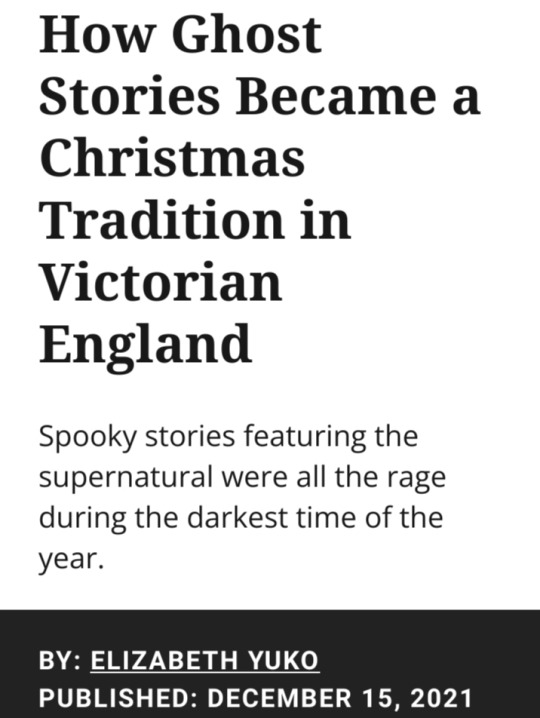
Towards the end of each year, as fireplaces are lit and hot cocoa is made, Americans have made it a tradition to revisit their favorite classic holiday books, movies and songs.
And though ghost stories may seem out of place in present-day American holiday celebrations, they were once a Christmas staple, reaching their peak of popularity in Victorian England.
A Dark, Spooky Time of Year
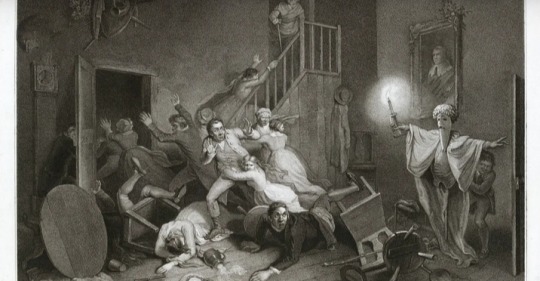
Like most longstanding cultural customs, the precise origin of telling ghost stories at the end of the year is unknown, largely because it began as an oral tradition without written records.
But, according to Sara Cleto, a folklorist specializing in British literature and co-founder of The Carterhaugh School of Folklore and the Fantastic, the season around winter solstice, has been one of transition and change.
“For a very, very, very long time, [the season] has provoked oral stories about spooky things in many different countries and cultures all over the world,” she says.
Furthermore, spooky storytelling gave people something to do during the long, dark evenings before electricity.
“The long midwinter nights meant folks had to stop working early, and they spent their leisure hours huddled close to the fire,” says Tara Moore, an assistant professor of English at Elizabethtown College, author of 'Victorian Christmas in Print' and editor of The Valancourt Book of Victorian Christmas Ghost Stories.
“Plus, you didn’t need to be literate to retell the local ghost story.”
Effects of the Industrialization Revolution

It was in Victorian England that telling supernatural tales at the end of the year — specifically, during the Christmas season — went from an oral tradition to a timely trend.
This was in part due to the development of the steam-powered printing press during the Industrial Revolution that made the written word more widely available.
This gave Victorians the opportunity to commercialize and commodify existing oral ghost stories, turning them into a version they could sell.
“Higher literacy rates, cheaper printing costs, and more periodicals meant that editors needed to fill pages,” Moore says.
“Around Christmas time, they figured they could convert the old storytelling tradition to a printed version.”
People who moved out of their towns and villages and into larger cities still wanted access to the supernatural sagas they heard around the fireplace growing up.
“Fortunately, Victorian authors like Elizabeth Gaskell, Margaret Oliphant, and Arthur Conan Doyle worked through the fall to cook up these stories and have them ready to print in time for Christmas,” Moore says.
Industrialization not only provided tools to distribute spooky stories, uncertainty during the era also fueled interest in the genre, says Brittany Warman, a folklorist specializing in Gothic literature and co-founder of The Carterhaugh School of Folklore and the Fantastic. She adds:
"Interest was driven by the rise of industrialization, the rise of science, and the looming fall of Victorian Britain as a superpower.
All of these things were in people's minds and made the world seem a little bit darker [and] a little bit scarier.”
Stories Find a Wide-Ranging Audience
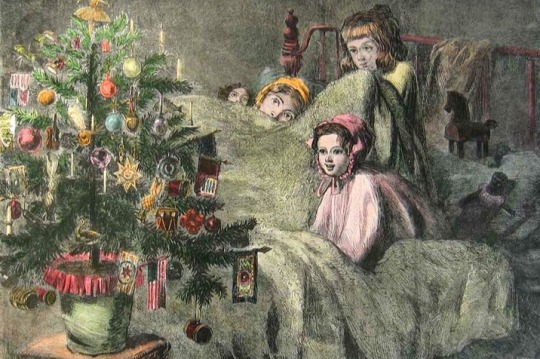
Telling horror-filled holiday tales continued to be a family affair in England, even when they were read rather than recited.
“We know from illustrations and diaries that whole families read these periodicals together,” Moore says.
The popularity of Victorian Christmas ghost stories also transcended socioeconomic status, according to Moore.
They were available to read everywhere from cheap publications to expensive Christmas annuals that middle-class ladies would show off on their coffee tables.
Their broad audience was reflected in the stories themselves, which sometimes centered around working class characters and other times took place in haunted manor houses.
“These upper class settings were intended to invite readers from all classes into an idealized, upper-crust Christmas, the type todays’ fans of Downton Abbey still enjoy as entertainment,” Moore adds.
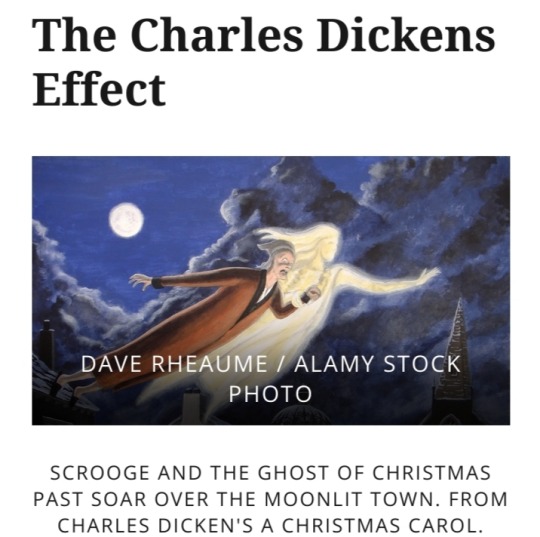
Charles Dickens’ 1843 novella A Christmas Carol has forever linked the British author with the holiday season, but his contributions to Christmas in Victorian England — including the tradition of telling and reading ghost stories — extend far beyond Jacob Marley’s visit to Scrooge.
In fact, Cleto says that Dickens played a “huge part” in popularizing the genre in England.
“He wrote a bunch of different Christmas novellas, several of which involved ghosts, specifically,” she says, “and then he started editing more and more Christmas ghost stories from other people, and working those into the magazines he was already editing. And that just caught like wildfire.”
Dickens also helped shape Christmas literature in general, Moore says, by formalizing expectations about themes like forgiveness and reunion during the holiday season.
American Christmas Traditions: More Syrupy Than Spooky
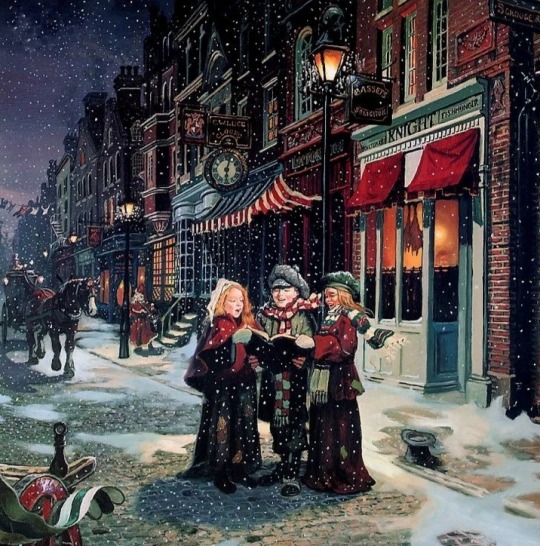
Although countless trends made their way from England to America during the Victorian era, the telling of ghost stories during the Christmas season was not one that really caught on.
A Christmas Carol was an immediate best-seller in the United States, but at the time of its publication, Dickens was arguably the most famous writer in the world and already wildly popular.
The novella’s success in the U.S. likely had more to do with Dickens’ existing (massive) fan base than it did Americans’ interest in incorporating the supernatural into Christmas.
“American Christmas scenes and stories tended to be syrupy sweet,” Moore explains.
"There were a few American writers of the period trying to put Victorian-style Christmas ghost stories into American culture,” Warman says, including Nathaniel Hawthorne and Henry James.
Washington Irving made a similar and earlier attempt, slipping the supernatural into Christmas-themed short stories published in 1819 and 1820.
Warman theorizes that America’s reluctance to embrace the Christmas ghost story tradition had to do, at least in part, with the country’s attitudes towards things like magic and superstitions.
“In America, we generally had a bit of a resistance to the supernatural in a way that European countries didn't,” she explains.
“When you come to America, you come with a fresh start. You come with a secular mindset and the idea that you were leaving the past behind. And some of these spooky superstitions were thought of as being part of the past.”
Another reason telling spooky stories never took off as a Christmas tradition in the United States was because it became more firmly established as a Halloween tradition, thanks to Irish and Scottish immigrants.
“That really impacted culture here, because they brought with them a concept similar to Halloween and that became, for America, the time period for ghosts,” Warman explains.
Traces of the Tradition
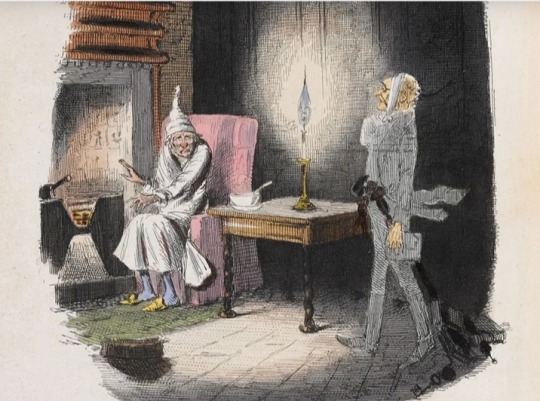
Other than A Christmas Carol, there is another piece of pop culture that reflects the Victorian Christmas tradition: a single line from a song written and released in 1963 by American musicians.
First recorded by Andy Williams, the song “It’s the Most Wonderful Time of the Year” lists 'scary ghost stories' as one of the highlights of the holiday season.
Although it’s unclear why the writers of the song (Edward Pola and George Wyle) included the tradition, Cleto says that it’s possible that the lyric is a reference to Dickens’ A Christmas Carol.
“It's only the one text,” she notes, “but it's such a big deal here in the US and the UK, and is pretty much all that Americans know about Christmas ghost stories in isolation.”
#Christmas#Christmas Ghost Stories#Victorian Era#1800s#19th century#Victorian England#oral tradition#written records#Sara Cleto#winter solstice#folklore#British literature#spooky storytelling#Tara Moore#steam-powered printing press#Industrial Revolution#ghost stories#Brittany Warman#Victorian Christmas#Charles Dickens#A Christmas Carol#Jacob Marley#Scrooge#Halloween
2 notes
·
View notes
Text
Luxury of Beauty
I'm a pretty thrifty person. A tight budget will turn you into one if you're not already.
An unfortunate side effect of that thrift-by-necessity is that I struggle to buy something just because it's pretty or fun.
I need a purpose for it.
This probably explains why I'm not a dice goblin. I've got a set; heck, I've got a bunch of cheap sets. Why should I need a bucket of dice? I just can't justify it to myself.
This is a problem.
Obviously, I can't pretend that money is no object and just start buying things for their beauty/loveliness without an eye to my budget.
But beauty shouldn't be a luxury.
We live in a world full of wonderful people and remarkable things. All that beauty should be available for people to access.
Beauty shouldn't be reserved only for those who can afford far above and beyond normal means.
I realize this isn't a world-shattering revelation, but it's gotten under my skin lately.
Maybe that's part of what is so special about oral tradition.
Oral tradition makes beauty accessible. Once someone hears a remarkable story, they can repeat it. Once someone understands a pattern of narrative or poetry, they can imitate it.
Beauty becomes commonplace when we learn to recite it.
Words belong to us, in whatever form we communicate. Stories are for regular people. We can take back that luxury and make it ours.
#storytelling#oral tradition#luxury#beauty#literature#narrative games#ttrpgs#ttrpg design#take back beauty
2 notes
·
View notes
Text
Wind and Fire (Fanfiction Chapter 1 of 2)
This is a Lukloé fic, with an Arabian Nights theme. Jinn!Chloé. It's written hopefully to sound like an old oral tradition story. Drama and angst, but a happy ending! text under the cut, feel free to drop by AO3(link in the bio) to leave a kudo or comment if you like!
In a time before the rise of the great cities, at the tail end of the taming of the great Jinn, a multitude of people crossed the desert and gathered in a narrow strip of green land between the outer deserts and a great maelstrom of wind and dust that consumed the very source of the rivers itself.
‘It should be green,’ all the wise men agreed, ‘and no wind of nature blows unceasing forever. It must be a Jinn.’
Yet as the extent of the Khamsin became known, the men said amongst themselves,‘Can it be only one? The Jinn are mighty indeed, but what could consume the whole of the land so completely and without end?’
There was nothing anyone could do; their ways of subduing Jinn required a target and the storm shrouded the whole of the land in mystery. Still, men are stubborn and they clung to the green. They raised up towns and in time even cities; harvesting, growing, learning, building, and flourishing.
The kings had much to be thankful for, but always they sought more. The perpetual sandstorm taunted them. Soon they sought to offer a portion of their amassed wealth should anyone quell the winds and reclaim the waste. Brave warriors from all across the land came, and they died.
Despite the assurance that not a single man nor woman had returned alive, legends began to spring up. At the center of the storm was indeed a Jinn. A solitary creature whose cries were the wind, whose tears were the sand, and who raged against some unknown fate unendingly.
This prompted the lovers to replace the fighters. Those who thought they could tame what could not be killed. They were as mistaken as those before them. Many brave and many more arrogant entered the wastes never to return.
Now at the outskirts of an outlying village on the ring of green, far from the inner wastes, lived a family of shepherds. Among their children was a boy considered touched by the spirits. He could tend flocks without crook or dogs. He crushed cobalt to powder and smeared it in his hair, and he played the oud more sweetly than musicians with a lifetime of experience.
It was this last that brought him to the attention of the Emirs. For the villagers said of him that on some days he would sit, watching the flocks and playing without making a sound. When asked how he plucked strings that made no sound he would reply, ‘There is a sound, but it is not for your ears. I play for the winds, that they will be still and keep the encircling sands from ruining our crops and scattering our flocks.’
And it was true that since this boy had taken up the oud, not once had the sands risen against his village. Storms that brought havoc to communities up and down the river refused to turn over a single leaf, or cause even a newborn’s cry within that blessed place.
Called upon and promised wealth to confront the great Khamsin, the boy declined.
‘I have all I need here with my family, how could I ever leave my people, and my flock?’
After invitations came instructions, reminders of duty, and promises of status for his family among the elite.
‘My family has all they need. I can do best by being here for them.’
After instruction came orders and threats. The boy would come, or this family that was his anchor would be put to the sword.
The boy took his instrument upon his back and headed for the cities.
It was many days' travel before he reached the first great city. As he stepped through the gates a sandstorm rose up and swallowed his village back home, erasing it from the land.
The boy was plied with wine, food, and women, he was offered gold beyond what he could carry, he was hailed as a soon-to-be hero. He declined all offers, asking only for a place to sleep before setting out the next morning before even the Emir’s guards had risen.
At the edge of the wastes the boy took out his oud and began to play. He played the songs that made no sound, and the tempest of wind scooped them out of the hollow of his instrument, carrying them back to the Jinn at the center of the storms. The winds parted before the boy and he stepped easily through lands that had buried even the mightiest of heroes.
He found the Jinn in a sheltered valley. She lay cloaked in winds, a vague shape with two luminous blue eyes that shone like crescent sapphires. The boy ceased his playing as he approached and she roused herself, sitting up to meet him with curiosity in those eyes. Behind her, black sand trailed like a crest of coiling hair.
“You have come far, and are barely an adult among your kind. You bear no sword, no spear, and no gifts. What purpose could you have with me?”
The boy sat himself down in the sands, looking up into the concealed face of the giant Jinn.
“I have been asked to come and subdue you, to still the winds, and allow this place to be settled. The people are many and the lands few.”
She laughed and winds swept dune into the air, revealing lush green beneath. The winds ceased and the lands were covered once more.
“Subdue me? Tell me then, how will you do this, and earn your green paradise?”
“I have no way to do so. The Emir believed in my music, but it is not a tool to imprison, only to soothe. Tell me if you would, why do you rage? Why do you cover this land in waste?”
Her laugh stirred the sands again, causing lightning to arc up into clear skies and thunder to rumble through a deep chuckle.
“Let us play a game. Look around you, boy. Tell me why you think I rage, and if you tell me correctly I will let you return home alive.”
The boy looked to the empty sky, the empty sands, then back to the Jinn.
“You are alone.”
“I am alone! Powerful among my kind, they feared me and cast me out! Here I sit, ‘to learn my lesson.’ Well, the lesson I have learned is that I hate them! Now I have nowhere to go. I would not rejoin my people even if I could!”
The boy considered this.
“I did not wish to leave my people, but I was made to, to visit you. If you will not be calm, then I fear I shall never be allowed to return. Will you not be still, that at least one of us might find relief? If you let the winds lay still, you could even come and see my village. The people there are warm and accepting of strangers.”
To this the Jinn offered silence. The boy sat and waited. He did not play, nor did he rise. The sun had moved far in the sky when the Jinn answered. A slash of diamonds appeared within the winds, a mouth for a spirit, curled into a smirk.
“Come back and play for me again. I know you must eat and drink. Do so, but return. Play and I will be still, for as long as you continue playing for me.”
“But if I do that, I shall never get to go home.”
She leaned down close to him, the living torrent of sands and wind formed features more beautiful than flesh and bone could muster.
“That is the bargain. Your people wish this land. I wish someone who might understand. I will free you one day from your bond, when my heart has stilled. Then you may return home, and yet I still may not.”
The boy considered this, then nodded and rose. He bowed low and took his leave of the Jinn. His trip home took less time than walking across his own room. In three steps he was back at the city gates.
Looking out over where the Khamsin had been there was only stillness now. The sand remained, but the skies were clear and even now those more brave than wise were exploring the nearest dunes.
Standing before the Emir, the boy explained the bargain he had made, then he retired for the evening. In his wake, advisors swarmed the Emir. They feared the boy would be harmed, become sick—or worse, die—before the Jinn was satisfied. Then all would be lost!
So on his trips into the waste the boy had an armed escort. In the city he was kept under guard, his every need catered to, provided he did not try to leave. He returned to the wastes, past people seeking to map and explore this newly opened land. It was a dead land, but even so travel across to the rest of the green ring was now many times faster.
He met with the Jinn again, and he played for her. She would lay on the sands and listen, or if the mood struck her dance as only the wind can; a light footed giant upon fragile peaks that would not hold a child. On one such visit he recalled the whispers and worries of the advisors in the city.
“Do not think me ungrateful for giving up on your wrath, oh great Jinn. I have a request, though, from those who have sent me. They worry if I should come to harm by no fault of theirs, that your wrath will undo the peace and send things back into ruin once more.”
She had buried herself, and when she breasted the sands she had buried herself in, torrents heavy enough to crush a man fell from her head and shoulders into new dunes. Huge now where she had been merely large before, she leaned down, one sapphire eye as wide as he was tall regarded him within the spinning depths of her body. When she spoke his bones rattled against each other.
“That is their concern, not mine. What do I care for them and theirs? What do they care for me? I like you, and that must be enough. If they wish peace, they had best protect that which I cherish above all else in this world.”
The boy set his fingers to strings again in earnest. By the time he left she was barely larger than a tigress, dozing in the lee of a shadowed slope.
In the city once more, he relayed the Jinn’s response and again the Emir spoke with his advisors in deep council. Moons came and went four times over while the boy played for the Jinn. On the eve of yet another departure, the Emir’s men pulled the boy aside. A circle of wise men presented him two bracers of Orichalcum inlaid with Lais and Onyx.
“We cannot risk the Jinn’s wrath. We have not been wasting our time as you risked your life. We sent riders far and wide to learn the secrets of taming the Jinn from olden times. Offer these to her as a gift. Since she is a Jinn of air, the elements of fire, water, and earth shall bind her.”
The boy was aghast.
“Bind the wind? How could you ask this of me? Wind is joy and it is meant to be free.”
The wise men argued.
“We must, for the safety of all. Jinn are deceitful and capricious creatures. Think of those who cannot protect themselves, and be their hero.”
The boy resisted, but he was simple and they were wise. Their words circled his head until they found a way in and in the end he took the bracers and went into the wastes.
#miraculous Ladybug#ml fanfiction#ml fanfic#ml au#lukloe#Arabian nights#oral tradition#luka couffaine#Chloé Bourgeois#angst#happy ending#musician luka#Jinn Chloé#I had fun writing this
3 notes
·
View notes
Text
Shapeshifting in french folklore

''At the Verrieres, a woman changed into a hare: one evening, a hunter shot the animal; he became a woman again and said:
"You are blessed to have missed me: if you had hurt me, you would have died." And she disappeared.''
#french folklore#france#legends#superstitions#shapeshifting#verrieres#transformation#fabulous animals#animal folklore#witches#witch folklore#french witchcraft#witchcraft#folklore#folklore francais#oral tradition
4 notes
·
View notes